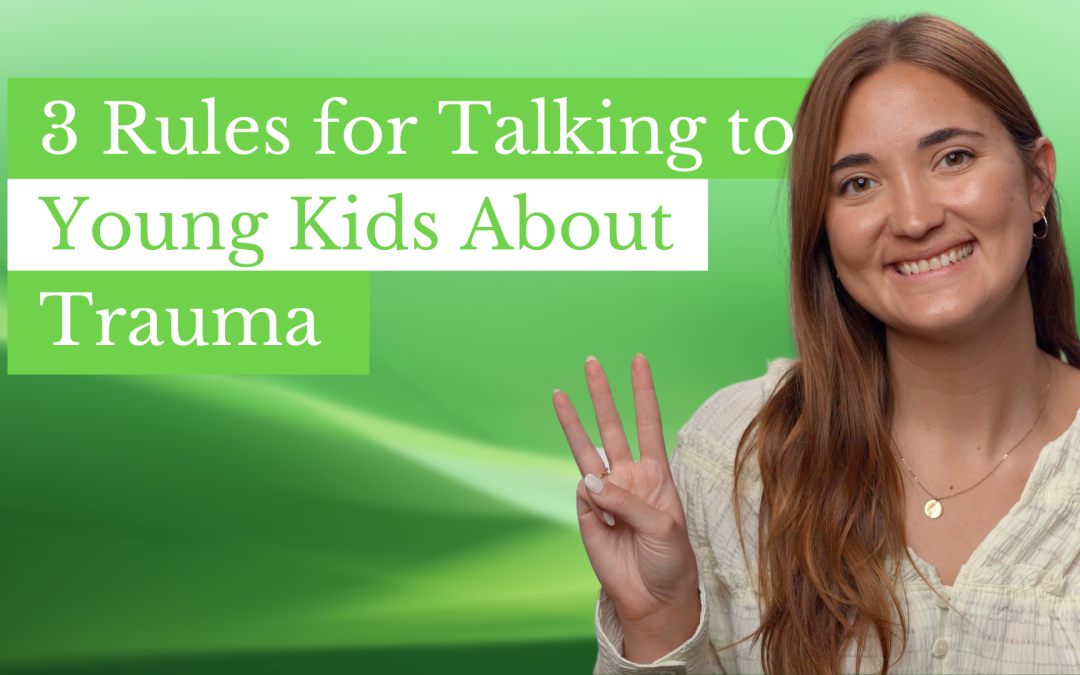Kids can experience traumatic events that are scary, upsetting, or even confusing. These experiences can have a lasting impact on their emotional wellbeing. As parents, it’s natural to want to protect our children from pain, but when trauma happens, talking about it is crucial for healing.
Hi, I’m Sophie Kaiser, a child therapist intern at Kid Matters Counseling. In this article, I’ll share 3 basic rules to remember when talking to young kids about trauma.
It’s important to remember that for a child, many different kinds of experiences can be traumatic. This may include losing a loved one, a car accident, exposure to violence, moving away, abuse or changes in family relationships.
Okay, here are my 3 rules for talking to young kids about trauma and, if you watch to the end, I’ll give you a bonus parenting tip:
Let the Conversation Flow
Never force a conversation about trauma. This can make children feel pressured or overwhelmed.
Instead, create a safe space for your child to talk when they are ready. This could involve reading books about similar experiences, drawing pictures, or simply being present while they play.
Name the Unnamable
Young children often lack the vocabulary to express complex emotions. It’s important for us to name the feelings they might be experiencing, even if they seem negative.
Saying things like, “I know you might feel scared after what happened,” or “It’s okay to be sad about that,” validates their experience and demonstrates your attentiveness to their feelings.
Speak Their Language
Young minds process information differently. Instead of using abstract language, keep things concrete.
For example, instead of saying, “mommy and daddy got too angry,” you could say, “mommy and daddy’s voices were too loud and they were using words that were not kind.”
Bonus tip: Take Ownership of Your Feelings
It’s also important to acknowledge your own feelings as a parent.
You might say, “I feel sad that you’re going through this,” or “It’s hard to know what to say, but I want you to know I’m here for you.” This shows your child it’s okay to have difficult emotions and encourages open communication.
Remember, you don’t have to have all the answers. If you feel your child needs extra support, don’t hesitate to schedule an appointment at Kid Matters Counseling today. Together we can help your child cope with trauma and put them on a path towards healing.

Sophie Kaiser
Child Therapist
With my extensive training and practical experience, I offer a unique blend of therapeutic techniques tailored to your child’s needs.
New Clients Call: (855) 586-1802
Current Clients: (855) 543-7687
Ask Us Anything!
We help anxious kids and frustrated parents. We serve Hinsdale & the Western Suburbs of Chicago.
Made with ♥︎ in Hinsdale, Illinois for Chicago
Built By Brand Your Practice.
Kid Matters Counseling, P.C. DISCLAIMER: This website and blog are for informational, educational and general discussion purposes only. It is understood that no guarantee or warranty arises from the information provided, discussed or commented upon in this website and blog nor does it constitute legal or other professional advice on any subject matter. Access to this website and blog is voluntary and at the sole risk of the user. If you think that you have a medical emergency (including clinical), call your doctor or 911 immediately. A licensed medical professional should be consulted for diagnosis and treatment of any and all medical conditions. While the information contained within this website and blog is periodically updated, no guarantee is given that the information provided is correct, complete, and/or up-to-date. See our complete Privacy Policy and Terms of Service.





